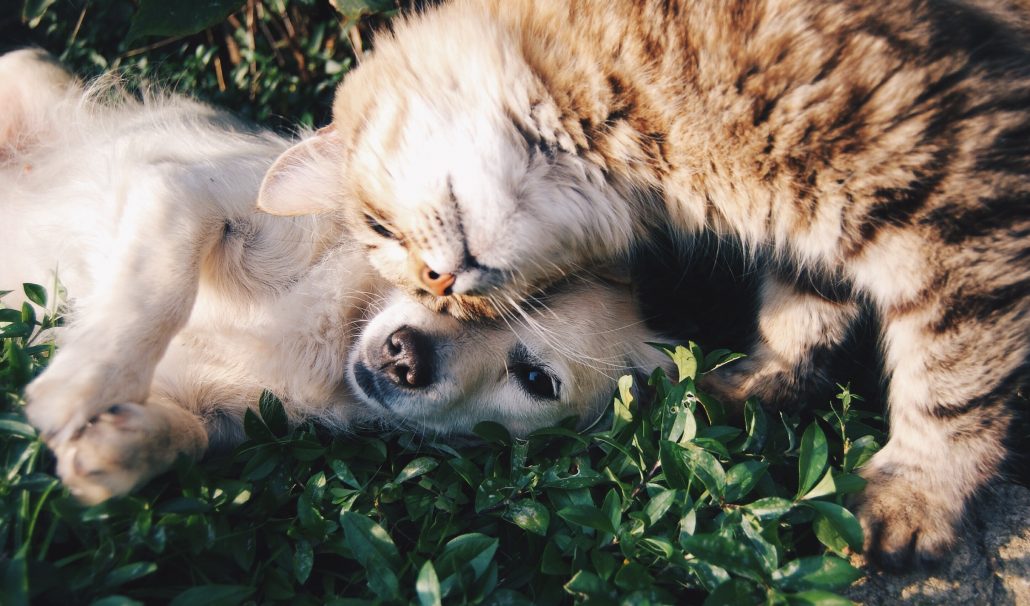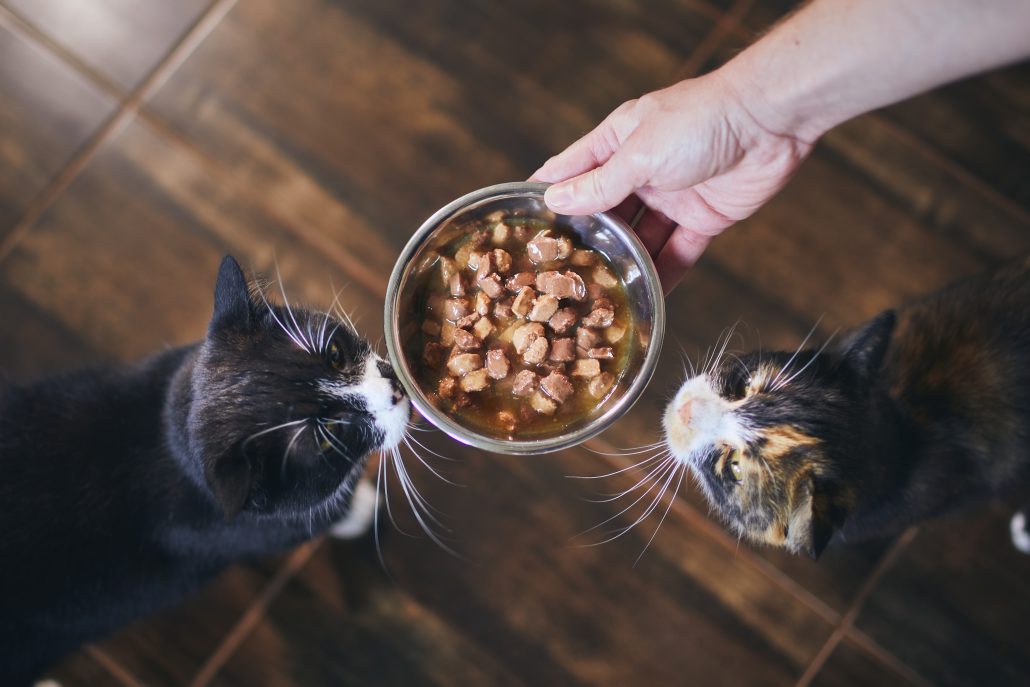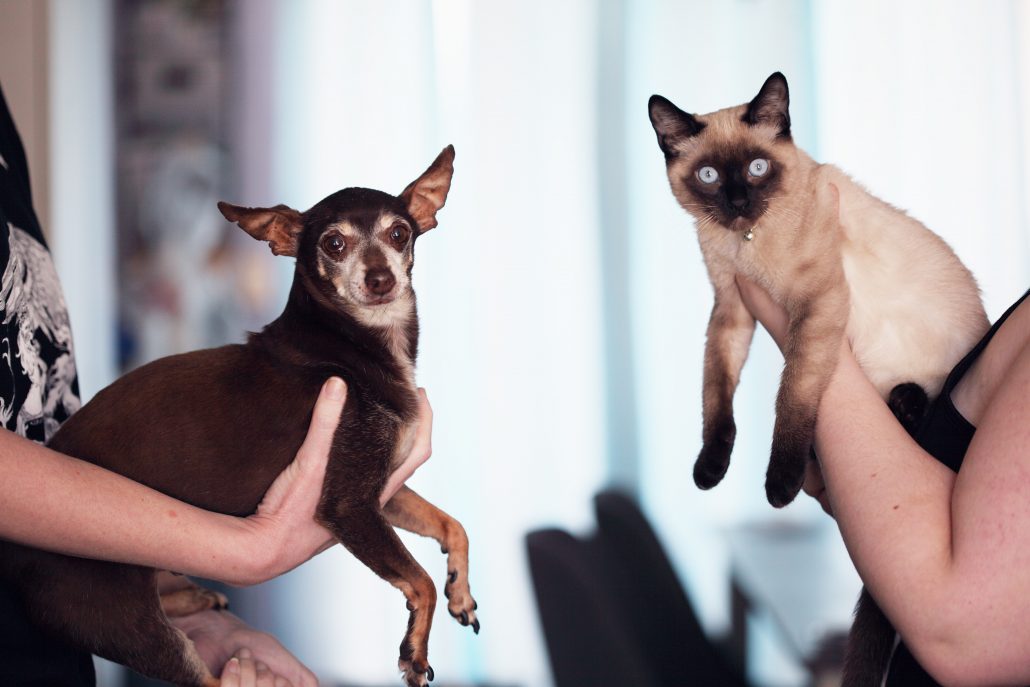
One of the hardest things about the relationship with our furry friends is that they can’t tell us when they’re not feeling well! Diarrhea is one of the most common problems that bring both dogs and cats to the vet. From cleaning up messes to getting up in the middle of the night to let your pet out to relieve themselves can become stressful quickly!
So, the question remains. Why is this happening and how can I help?
Diarrhea in both dogs and cats can be associated with a number of underlying conditions. Whether you’re dealing with a messy house or losing sleep, understanding the root causes of your pet’s discomfort is crucial for their well-being.
In most cases, diarrhea in dogs and cats will resolve itself in a matter of a few hours or a few days. However, it’s essential to delve deeper into the reasons behind it, exploring potential triggers, preventive measures, and when to seek professional help. In this guide, we’ll discuss everything you need to know about diarrhea in your beloved pets, empowering you with the knowledge to ensure their health and happiness!
Understanding Acute & Chronic Diarrhea
Diarrhea is one of the more common reasons many pet parents bring their pet to the vet and refers to a loose or soft stool. It is important to remember that diarrhea is not a disease itself, but rather an underlying symptom of a different problem. While it is most characterised by accidents and messy cleanups, cat and dog diarrhea also means that your pet is not absorbing enough water, electrolytes and nutrients.
There are two common types of diarrhea in cats and dogs – Chronic diarrhea and Acute diarrhea.
Chronic diarrhea: This is when your pet does not respond to traditional diarrhea treatments or experiences two or more bouts despite ongoing management and treatment.
Acute diarrhea: On the other hand, acute diarrhea happens suddenly and will normally resolve on its own, or with treatment.
What Causes Diarrhea in Dogs and Cats?
Diarrhea is one of the most common signs of gastrointestinal upset in your furry friends. Oftentimes it may be the cause of something simple like having eaten something bad or there is an abrupt change in their diet. However, diarrhea can also be a symptom of something more complicated like cancer or organ problems.
The list of possible causes of diarrhea in cats and dogs is long and varied. Some of the most common causes are:
- Parasitic, bacterial or viral infections
- Rapid dietary change
- Gastrointestinal toxins
- Food hypersensitivity
- Intestinal cancer
- Intestinal obstruction
- Systemic endocrine or metabolic conditions
- Medication reaction
- Inflammatory bowel disease
Monitoring Your Pets
What is important to remember is that regardless of the cause, prolonged or chronic diarrhea in cats and dogs can lead to debilitating dehydration, electrolyte imbalances, protein loss and more. These imbalances can quickly become a vicious cycle that leads to serious illness, and even death if not recognised and treated on time.
That’s why it is always important to monitor your pet closely. You know your furry friend best! So, if your pet’s energy level is lower than it normally is, they’re vomiting, have experienced weight loss, have a pre-existing medical condition or compromised immune system that would make them less able to deal with the effects of dehydration, then you shouldn’t let their diarrhea go on any longer than 36 hours.
Similarly, if your pets are very young puppies or kittens or in their “golden years” their diarrhea should not go unchecked. This can lead to dehydration and other complications that will prolong your pet’s discomfort as well as make treatment more difficult and expensive.

Diarrhea Treatment & Management
When it comes to treating and managing diarrhea in dogs and cats, your approach to treatment will vary based on the underlying problem. From temporarily witholding various food to complex surgical interventions for more severe issues, the goal is to address the root cause effectively.
Cases of mild diarrhea typically respond well to some TLC and basic home care. However, it is important to monitor and assess your pet. If they seem well and aren’t displaying other symptoms such as lethargy, poor appetite or vomiting you are likely not dealing with an emergency situation. However, it is always better to be safe than sorry, so if you think it’s best, take your pet in for a checkup!
1. Tailored Treatment for Underlying Issues
- Temporary Food Withholding: In some cases, withholding food for a short period may be recommended.
- Surgical Interventions: For more serious underlying problems, surgical procedures might be necessary.
2. At-Home Care for Mild Cases
- Tender Loving Care (TLC): Cases of mild diarrhea often respond well to basic home care and attention.
- Monitoring and Assessment: Watch for signs of improvement or worsening. If your pet appears well and lacks symptoms like lethargy, poor appetite, or vomiting, it may not be an emergency.
3. Hydration and Rest
- Access to Fresh Water: Ensure your pet has constant access to fresh water to prevent dehydration.
- Rest: Allow your pet to rest to aid recovery.
4. Dietary Management
- Highly Digestible, Low-Fat Diet: Implement a “bland diet” consisting of boiled chicken breast, boiled white rice, or prescription diet food. This diet helps in improving digestion and easing the gastrointestinal system.
5. When to Go To The Vet
- Duration of Diarrhea: If diarrhea continues for more than 36 hours, it’s crucial to consult your veterinarian. Extended or chronic diarrhea could indicate serious issues like liver disease, kidney disease, diabetes, viral infections, allergic bowel disease, or even certain cancers.

Taking Your Pet To The Vet: What Will We Do?
We all think that a quick google will help answer all our medical questions, however nothing beats the advice and opinion from a trained professional. Taking your pet to the vet is often the best option when you have concerns about their health.
A thorough questioning is crucial to determining the cause of your pet’s diarrhea. Don’t worry, we aren’t interrogating you, we just need as much information as possible so that we can ensure the best treatment for your companion. Common questions we’ll ask include:
- How long has the diarrhea been going on?
- What does the stool look like(what colour is it, is there any blood, etc? )
- Is your pet on any medications or supplements?
- What is your pet’s regular diet?
- Has your pet recently gotten into the trash or compost?
- Has your pet been around multiple other pets?
Physical Exam
There really is a wealth of important information that your vet will obtain from a physical examination of your pet. These include whether or not your pet’s abdomen is painful, whether or not there is a mass or foreign body within your pet’s rectum, or elsewhere within your pet’s intestinal tract or other body systems such as the small intestines or large intestines.
Your vet will pick up on important things during the course of their physical examination that you may not have thought of or found yourself. They will be able to identify if your pet has inflammatory bowel disease, acute diarrhea, pancreatic insufficiency or their symptoms are a side effect of other veterinary medicine (if they are taking it)
Tests
Depending on what is found during your pet’s examination, various tests may be conducted to help include or exclude underlying conditions and causes. The most common test is the “fecal float and smear”. This test looks at intestinal parasites and bacteria. Additional test include blood tests, x-rays or ultrasounds.
Diagnosis & Treatment
Once your veterinarian has found the cause of your pet’s diarrhea, they will recommend treatments to help ease your pet’s symptoms. In most cases, a bland diet and time is all that is needed to resolve their diarrhea.
However, if there is a more serious underlying cause various different treatments will be recommended. The medical treatment that will be most effective will be determined by the results of their history, physical exam and diagnostic testing. These may include intravenous fluid therapy (IV fluids) to treat dehydration, various medications if there are pests or bacterial infections.

Ensuring Tails Wag and Whiskers Purr
When dealing with loose stools and diarrhea in dogs and cats, the answers and treatments can seem easy until they aren’t! Ultimately, it’s crucial to monitor your pet closely and to keep your veterinarian informed when you are concerned about your pet’s symptoms. Our pets can’t talk to us to tell us how they feel, its up to us to make sure they are healthy!
Need expert advice on managing diarrhea in dogs and cats? Contact The House Call Vet today and our team of enthusiastic veterinarians are happy to assist. From routine check-ups and mobile vet care services to emergency appointments, we provide comprehensive and compassionate care for your pets

